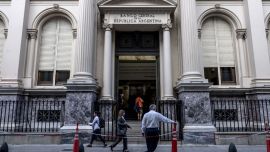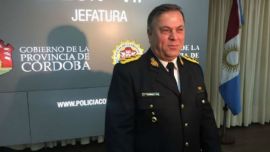Argentina’s main opposition coalition is seeking to turn the page after a tumultuous week of very public infighting that exposed fault-lines among Juntos por el Cambio’s leading figures.
The row erupted on Monday after Buenos Aires City Mayor Horacio Rodríguez Larreta announced that voters in the capital will cast ballots in the local and general elections on the same day.
Confirming a move trailed last weekend in the local press, the PRO presidential hopeful said that voters will go to the polls on the same day but on separate ballots, a move he described as a “concurrent split.”
The move is a shift from previous years when the race for City mayor has been decided in advance of national elections. Under the new format, voting will use two different systems: an electronic system will be used for local elections with paper ballots used for the general elections.
The news was met with fierce criticism from his coalition allies, with a host of Juntos por el Cambio heavyweights taking to social media to denounce the decision. Former president Mauricio Macri, for example, described the move as a “profound disappointment.”
In what commentators saw as a warning to Rodríguez Larreta, the ex-president had remarked over the weekend that such a vote would be "going against everything we have worked for over so many years.”
The former president’s comments came just minutes after Juntos por el Cambio presidential hopeful María Eugenia Vidal also voiced her dismay. She linked the decision to the City mayor’s “personal ambitions” and rejected the news.
"We are the change or we are nothing," Vidal posted on social media. "What PRO and the JxC [Juntos por el Cambio] promised to the Argentines is not this," said the national lawmaker and former governor of Buenos Aires Province via social media.
"There is no personal ambition which can be above our values and the team. We are the change or we are nothing.”
Rodríguez Larreta’s main rival in the race for the opposition presidential nomination, PRO chair Patricia Bullrich, also weighed in, posting a video from last November in which the mayor said that changing the rules was akin to “cheating.”
“It is very simple: consistency and conviction are the values we stand for,” wrote Bullrich.
“That's why: ‘It's wrong to change the rules. It's cheating,’ as Horacio Rodríguez Larreta said,” she continued.
By the end of the week, all of the coalition’s leading figures were playing down talk of a permanent break or fracture. Macri said midweek that the opposition “has to be able to get over the row” and that he hoped there was no long-term damage to the coalition over the row. Sources close to Rodríguez Larreta also played down tensions, with Bullrich refusing to pass further comment on the issue. Vidal said that “one disagreement” did not equal “a rupture.”
‘My commitment’
According to Rodríguez Larreta, who is serving his last term as City mayor and running for the opposition presidential nomination, the move will prevent porteños from having to go to vote up to six times this year and make less of a dent in the capital’s coffers.
"It saves us a lot of time and avoids unnecessary expense,” said the presidential candidate in a video announcement confirming the move.
"We are going to do it with a single electronic ballot, which is a more agile, simpler, a more transparent system and is a banner of PRO that Mauricio [Macri] started in the City in 2015 and that we also promoted together with Juntos por el Cambio at the national level," he explained.
Some figures in the opposition coalition have previously called for the switch to an electronic system and to unify voting on the same day.
Analysts saw the move as a bid by Rodríguez Larreta to underline his autonomy from Macri and as a concession to Unión Cívica Radical (UCR) Senator Martín Lousteau, who is running for the City Hall mayoral post.
Lousteau, one of the mayor’s closest allies in the UCR, has reportedly asked Rodríguez Larreta not to bring forward the local elections in a bid to level the playing-field and his party says such a move will give greater “autonomy” to the capital.
Others noted that Rodríguez Larreta will hope that whatever candidate he backs in the PASO primaries will win big, helping him to gain momentum and a more dominant leadership within PRO and the opposition coalition in the run-up for the national presidential vote.
Macri is pushing for his cousin, Jorge Macri, to succeed Rodríguez Larreta in City Hall.
According to the national electoral calendar, the PASO primaries will be held on August 13 and general elections on October 22.
Voters in Buenos Aires will cast two ballots on the same dates: one for authorities and lawmakers in the Federal Capital and another for president and national deputies.
If a run-off is needed in the presidential race, that will take place on November 19.
Preference for PRO
In a nod to the battle to replace him as mayor, Rodríguez Larreta also sought to shoot down rumours he would formally back Lousteau’s bid to be his successor, declaring that he will “support a candidate from my party, which is the PRO" – a reference to mayoral hopefuls Jorge Macri, Fernán Quirós and Soledad Acuña, who all currently form part of his government.
Rodríguez Larreta’s decision did win backing from the Coalición Cívica ARI, the third leg of the Juntos por el Cambio trident. In a statement, the party led by veteran lawmaker Elisa ‘Lilita’ Carrió offered its backing for the mayor, firmly backing his autonomy.
In a statement, the UCR – the second leg of the Juntos por el Cambio trident – criticised Macri’s remarks and observed that it was “contrary to what he did as head of [the City] government.”
In 2015, as then-City mayor, Macri brought forward the local elections and residents in the capital had to vote six times (between local and national elections). In that year, the single electronic ballot was also implemented for the first time, a system which will now be used again.
In 2018 Rodríguez Larreta succeeding Macri as Mayor proposed an electoral code similar to the one announced this week and the City Legislature approved it by a 49.5. Ironically enough, one of the few critics then was Lousteau, who is now a leading advocate within Juntos por el Cambio. But this code was ignored by Macri in the 2019 general elections because he felt that he could not afford to separate the ballots, needing to bolster his presidential reelection bid with PRO votes at municipal level. Critics accusing Rodríguez Larreta of changing the rules are referring to the system used in 2019.
This will not be the first time that Buenos Aires City has adopted such an approach to voting, though never before has it been decided that ‘split’ elections will take place on the same day as the national general election.
Aftermath
A key moment in the aftermath came on Wednesday when most of the Juntos por el Cambio leadership including Macri and Horacio Rodríguez Larreta (who nevertheless did not speak to each other) were all together at a Rural Society business event where the presidential hopefuls briefly outlined their election platforms.
On the same day Macri spoke at the CICyP (Consejo Interamericano de Comercio y Producción) lunch but sought to brush over the tensions: “We are in an unprecedented situation for PRO, competing constructively knowing how important it is to return to power along with the egos, the rivalries and the vehemence . I love competition. We have to be able to get over this situation. I trust in their being no damage to the coalition.”
While expressing disagreement with the concurrent elections proposed by Rodríguez Larreta, PRO deputy María Eugenia Vidal insisted: "One disagreement does not signify rupture,." a possibility also ruled out by Rodríguez Larreta.
After lining up with Macri and Vidal earlier in the week, Patricia Bullrich stayed mum at the Rural Society event, saying: “I will not speak again on Rodríguez Larreta’s decision.” Instead she told her business audience that her presidency would totally abolish export duties on farm produce. Earlier the City Mayor had said: “You will never hear me criticising other members of Juntos por el Cambio.”
The Radicals responded to Macri: "What he is saying is contrary to what he did."
– TIMES/NA/PERFIL






















Comments